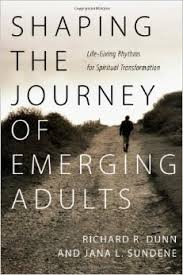During my seminary years, I took a class on discipleship. I enjoyed our teacher. I enjoyed the class. I did not enjoy the final class project. We were supposed to design an image and curriculum that conveyed our plan of discipleship.
I hated it. Going through the hoops, I sketched out some baseball diamond shape, but I would never have used it (partially because I cannot imagine celebrating “second base” with a disciple). As modernism invaded our seminaries, students and professors planned and objectified everything about the faith – including disciple-making.
Discipleship cannot be summed up in a curriculum, or Jesus could have simply written a textbook.
 Shaping the Journey of Emerging Adults: Life-Giving Rhythms for Spiritual Transformation by Richard Dunn and Jana Sundene was published by Intervarsity in 2012. This book steps towards removing the modernistic perspective by inspiring the church to build intergenerational relationships for the cause of the Kingdom. Along with the authors, I believe, “Fully mature spiritual adulthood cannot be reached without intentional relationships that invest Christ’s grace, truth, and love into the young adult’s life.” (Dunn, 16)
Shaping the Journey of Emerging Adults: Life-Giving Rhythms for Spiritual Transformation by Richard Dunn and Jana Sundene was published by Intervarsity in 2012. This book steps towards removing the modernistic perspective by inspiring the church to build intergenerational relationships for the cause of the Kingdom. Along with the authors, I believe, “Fully mature spiritual adulthood cannot be reached without intentional relationships that invest Christ’s grace, truth, and love into the young adult’s life.” (Dunn, 16)
I appreciate their understanding of the challenges facing emerging adults (who are currently Millennials) without bashing them. They state,
A caring disciple maker does not soothe the unpleasant aspects of this stage away. Instead, they value this God-given time of life as a way for the young adult to become more attuned to the work of becoming like Christ. (Dunn, 40)
The authors’ understand that, “Among today’s emerging adults, often there are less consistent markers, making ‘reaching adulthood’ more confusing.” (Dunn and Sundene, 40) Marking the road to adulthood by developmental markers (rather than traditional markers like marriage, children, buying a home, or having a job) helps emerging adults continue to mature. I believe there are three main developmental markers for emerging adults: Discovering Vocation, Establishing Autonomy, and Developing Community.
The book presents three “Life-giving Rhythms” for Spiritual Transformation. I appreciate the imagery provided by the phrase “life-giving” because sometimes our spiritual development appears to drain the life out of us rather than give us the life that Jesus speaks about in John 10:10. Their three rhythms are:
1. Discernment
“Disciplemaking relationships can take multiple forms, varying in style and approach according to the personalities involved.” (Dunn and Sundene, 65) Listening to the voice of God on the behalf of another requires discernment. A disciple-maker’s desire is not simply for us to examine their lives and see what we want changed, but to listen to them and discern what God is doing.
2. Intentionality
Spiritual depth in relationships rarely happens naturally, but requires intentionality. “Intentionality produces positive spiritual tension.” (Dunn and Sundene, 91) Disciple-making is filled with “awkward” moments that are not to be avoided, but cherished.
3. Reflection

Photo Courtesy of Aaron Robert Photography. Copyright 2014. www.aaronrobertphotography.com
I appreciate their emphasis upon the importance of reflection for both emerging adults, and those working with them. Emerging adults are too focused on surviving the present, and forget to savor the past. It is important for all Christians to reflect on God’s work and faithfulness in the past in order to hold to faith in the present.
These three aspects frame their practical applications, and are helpful for those seeking to impact others. What a great gift to the church in order to help us move towards a new era of disciple-making.
The “life-giving rhythms” of spiritual transformation should not be practiced only by older adults, but both sides of intergenerational relationships give and receive. This is what makes the body of Christ not dependent on one another, but interdependent as God designed us to be.
Dr. G. David Boyd is the Founder and Managing Director of EA Resources, a non-profit designed to provide resources to churches and parents of emerging adults.

















 Earlier this week, I wrote about the 5 “Disastrous” Results of Inviting Emerging Adults into Leadership. I came across an
Earlier this week, I wrote about the 5 “Disastrous” Results of Inviting Emerging Adults into Leadership. I came across an 
 It is official! The reign of the Babyboomers as America’s largest living generation is coming to an end. The population of the Millennials is currently 75 million, but is expected to increase due to immigration.
It is official! The reign of the Babyboomers as America’s largest living generation is coming to an end. The population of the Millennials is currently 75 million, but is expected to increase due to immigration.



